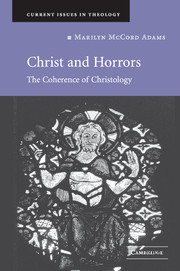Book contents
- Frontmatter
- Contents
- Preface
- 1 Christology as natural theology: methodological issues
- 2 Posing the problems: beginning with Job
- 3 Sharing the horrors: Christ as horror-defeater
- 4 Psychologizing the person: Christ as God-man, psychologically construed
- 5 Recovering the metaphysics: Christ as God-man, metaphysically construed
- 6 Learning the meanings: Christ in the hearts of all people
- 7 Cosmic coherence and the primacy of Christ: Christ, the One in Whom all things hold together
- 8 Resurrection and renewal: Christ the first fruits
- 9 Horrors and holocausts, sacrifices and priests: Christ as priest and victim
- 10 Christ in the sacrament of the altar: Christ in the meantime
- Bibliography
- Index
1 - Christology as natural theology: methodological issues
Published online by Cambridge University Press: 03 December 2009
- Frontmatter
- Contents
- Preface
- 1 Christology as natural theology: methodological issues
- 2 Posing the problems: beginning with Job
- 3 Sharing the horrors: Christ as horror-defeater
- 4 Psychologizing the person: Christ as God-man, psychologically construed
- 5 Recovering the metaphysics: Christ as God-man, metaphysically construed
- 6 Learning the meanings: Christ in the hearts of all people
- 7 Cosmic coherence and the primacy of Christ: Christ, the One in Whom all things hold together
- 8 Resurrection and renewal: Christ the first fruits
- 9 Horrors and holocausts, sacrifices and priests: Christ as priest and victim
- 10 Christ in the sacrament of the altar: Christ in the meantime
- Bibliography
- Index
Summary
Introduction
My topic is Christology; my thesis, the coherence of Christology; my theme, Christ as the One in Whom all things hold together. Metaphysically, Christ is the center both of Godhead and cosmos. Existentially, Christ is the integrator of individual positive personal meaning; psychologically, our inner teacher; body-politically, the organizer of Godward community. Christ saves us by virtue of being real and really present: Emmanuel, God with us, sharing our human condition; ascended to His most glorious throne in heaven at God's right hand; in the most blessed sacrament of the altar; and in the hearts of all His faithful people. Switching from object- to metalanguage, from the order of reality to the order of theory, turn-of-the-twentieth-century Anglicans declare that Christology is the centerpiece of systematic theology, that which integrates the creed, that from which we reason up to the Trinity, down to creation, out through the Church to the world. My own conviction is that they got this substantially right. Thus, in arguing for the coherence of Christology, I will take the coherence of theism for granted. But I will not treat Christology as an optional supplement to generic – what philosophers of religion often call “restricted-standard” – theism. My contention is that, because of its explanatory power, Christology has an integrating force of its own.
In the order of discovery, my argument begins with soteriology: with the fact that the human condition generally and Divine–human relations in particular are non-optimal.
- Type
- Chapter
- Information
- Christ and HorrorsThe Coherence of Christology, pp. 1 - 28Publisher: Cambridge University PressPrint publication year: 2006



